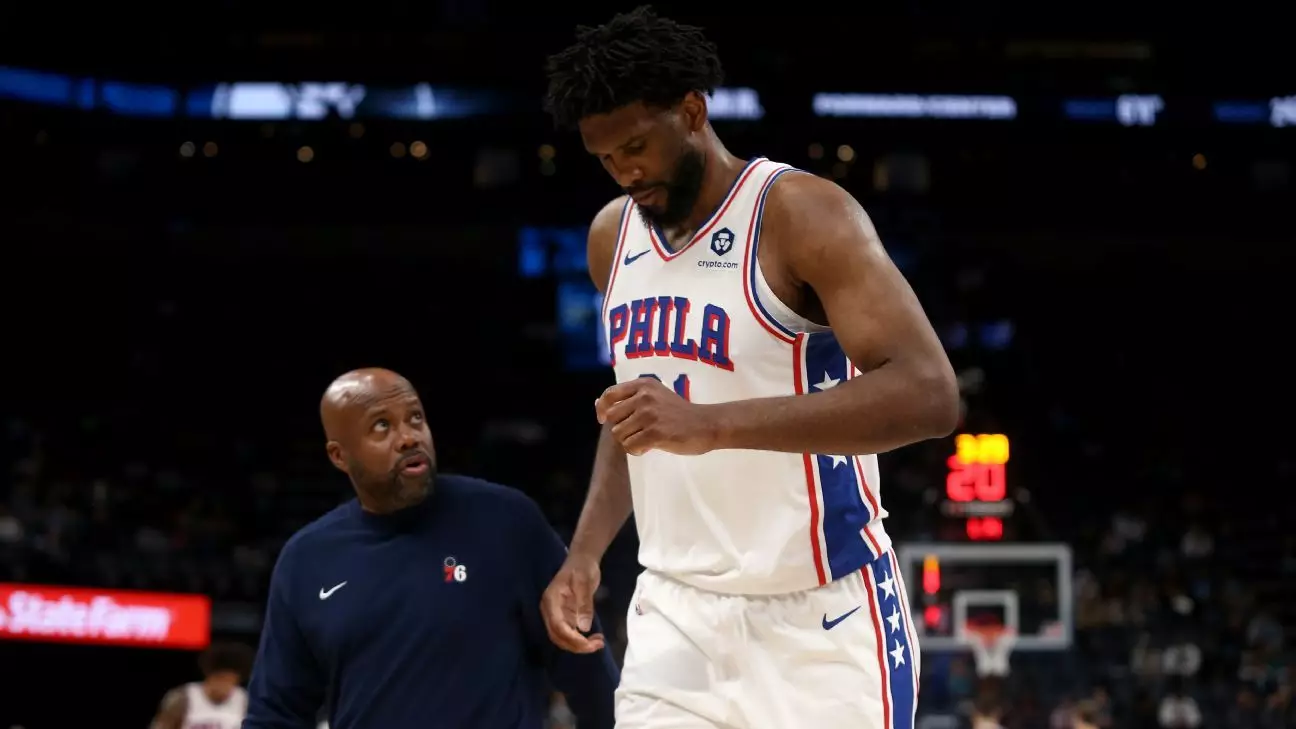The Philadelphia 76ers find themselves at a crossroads, with star center Joel Embiid’s recurring knee issues casting a long shadow over their season. As discussions intensify between Embiid, team doctors, and specialists, the possibility of surgery has emerged as a serious consideration. This promising squad, once seen as strong contenders for the NBA championship, now finds itself grappling with a series of unfortunate injuries and disappointing performances.
Joel Embiid’s left knee has been a persistent source of concern since his meniscus tear, which sidelined him for a substantial portion of last season. Despite a courageous return that saw him contribute to the 76ers’ playoff journey and earn a gold medal with Team USA, this season has proven to be another uphill battle. The dual struggles of past injuries intertwining with new setbacks—most notably his foot sprain—have limited him to appearances in just 19 of the 56 games this season.
The necessity for ongoing treatments, including regular injections, reflects a desperate attempt to manage pain rather than a solution for healing. This situation emphasizes the broader narrative surrounding athletes with chronic injuries: how mechanics of the body, coupled with the fierce pressure to perform, can lead athletes down a path of temporary fixes rather than recovery. As Embiid prepares for additional tests this week, the 76ers face an uncertain future regarding his health.
With the 76ers suffering through a streak of seven consecutive losses, a cloud of desperation looms over the franchise. The team’s aspirations for a championship have been sharply juxtaposed with their current reality—sitting at an unimpressive 20-36 record. The playoff hopes that once felt secure are fading with each passing game, exacerbated by the recurring injuries that have plagued key players. The statistics are telling; even when the trio of Embiid, Paul George, and Tyrese Maxey are on the court together, the team’s record of 7-8 suggests a deeper dysfunction lurking beneath the surface.
Moreover, the organizational implications of their struggles are significant. The 76ers’ first-round draft pick is top-six protected, which means that if they continue to falter, the team risks losing potentially valuable assets to the Oklahoma City Thunder. Such situations often force franchises to reevaluate their strategies, either aiming for immediate recovery or planning for rebuilding.
One might perceive Saturday’s loss to the Brooklyn Nets as a detrimental blow to the 76ers, yet it may also serve as a pivotal moment for reflection and reassessment. The game featured a troubling performance from Embiid, who struggled offensively, scoring just 14 points and missing all his three-point attempts. His late-game issues and visible discomfort raise questions about his current form and overall fitness.
Furthermore, with Embiid being deemed questionable for the following game against the Chicago Bulls—a match the team desperately needs—it remains uncertain how the season will unfold. Will the 76ers finally make the difficult decision between risking Embiid’s long-term health for the sake of a playoff push versus considering him resting for extended periods or even pursuing surgical options?
The Path Forward
As the 76ers navigate this tumultuous chapter of their season, the front office, coaching staff, and medical team must collaborate to forge a pathway forward. Maintaining the balance between urgency and prudence is essential. As Embiid’s situation evolves, decisions made now could have profound implications, not just for the remainder of this season, but also for the franchise’s future.
Sports are unpredictable, and the narrative can change rapidly; however, the story of the 76ers this year serves as a poignant reminder of the tenuous relationship between ambition and injury. In the coming days, the team will need to make crucial choices that will either steer them back towards contention or usher in an era of introspection and rebuilding.

